级人教版八级下册英语Unit第四单元笔记练习
- 格式:pdf
- 大小:33.71 KB
- 文档页数:6
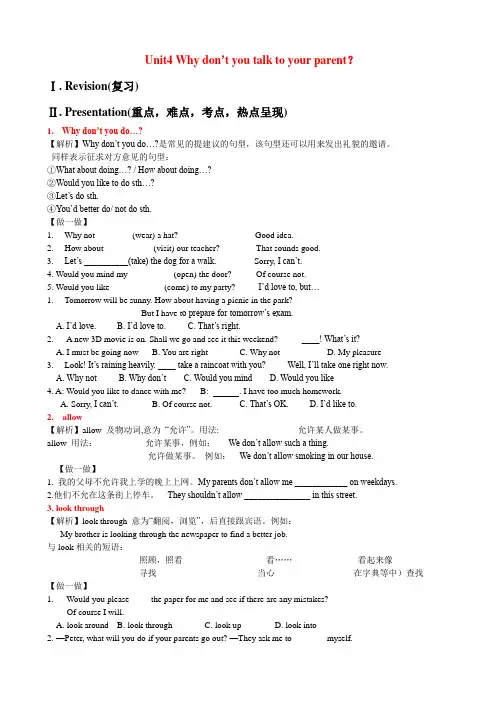
Unit4 Why don’t you talk to your parent?Ⅰ. Revision(复习)Ⅱ. Presentation(重点,难点,考点,热点呈现)1.Why don’t you do…?【解析】Why don’t you do…?是常见的提建议的句型,该句型还可以用来发出礼貌的邀请。
同样表示征求对方意见的句型:①What about doing…? / How about doing…?②Would you like to do sth…?③Let’s do sth.④You’d better do/ not do sth.【做一做】1. ---Why not ________(wear) a hat? ----Good idea.2. ---How about ___________(visit) our teacher? -----That sounds good.3. ---Let’s __________(take) the dog for a walk. ----Sorry, I can’t.4. Would you mind my __________(open) the door? ----Of course not.5. Would you like ____________(come) to my party? -----I’d love to, but…1. ---Tomorrow will be sunny. How about having a picnic in the park?---_________________ But I have t o prepare for tomorrow’s exam.A. I’d love.B. I’d love to.C. That’s right.2. --- A new 3D movie is on. Shall we go and see it this weekend? --- ____! What’s it?A. I must be going nowB. You are rightC. Why notD. My pleasure3. ---Lo ok! It’s raining heavily. ____ take a raincoat with you? ---Well, I’ll take one right now.A. Why notB. Why don’tC. Would you mindD. Would you like4. A: Would you like to dance with me? B: . I have too much homework.A. Sorry, I can’t.B. Of course not.C. That’s OK.D. I’d like to.2. allow【解析】allow 及物动词,意为“允许”。
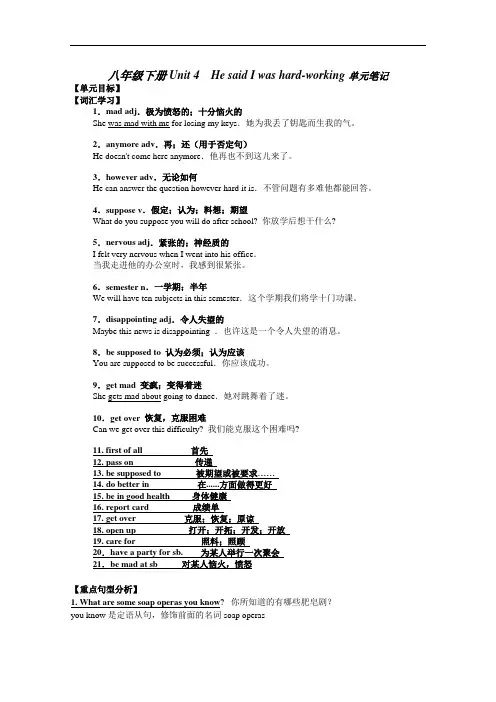
八年级下册Unit 4He said I was hard-working单元笔记【单元目标】【词汇学习】1.mad adj.极为愤怒的;十分恼火的She was mad with me for losing my keys.她为我丢了钥匙而生我的气。
2.anymore adv.再;还(用于否定句)He doesn't come here anymore.他再也不到这儿来了。
3.however adv.无论如何He can answer the question however hard it is.不管问题有多难他都能回答。
4.suppose v.假定;认为;料想;期望What do you suppose you will do after school? 你放学后想干什么?5.nervous adj.紧张的;神经质的I felt very nervous when I went into his office.当我走进他的办公室时,我感到很紧张。
6.semester n.一学期;半年We will have ten subjects in this semester.这个学期我们将学十门功课。
7.disappointing adj.令人失望的Maybe this news is disappointing .也许这是一个令人失望的消息。
8.be supposed to 认为必须;认为应该You are supposed to be successful.你应该成功。
9.get mad 变疯;变得着迷She gets mad about going to dance.她对跳舞着了迷。
10.get over 恢复,克服困难Can we get over this difficulty? 我们能克服这个困难吗?11. first of all 首先12. pass on 传递13. be supposed to 被期望或被要求……14. do better in 在......方面做得更好15. be in good health 身体健康16. report card 成绩单17. get over克服;恢复;原谅18. open up 打开;开拓;开发;开放19. care for照料;照顾20.have a party for sb.为某人举行一次聚会21.be mad at sb 对某人恼火,愤怒【重点句型分析】1. What are some soap operas you know? 你所知道的有哪些肥皂剧?you know是定语从句,修饰前面的名词soap operas2. What are some things that happen on soap operas?肥皂剧里发生了些什么事?That happen on soap operas 是定语从句,修饰前日面的名字something.拉娜说她不再生玛西娅的气了。
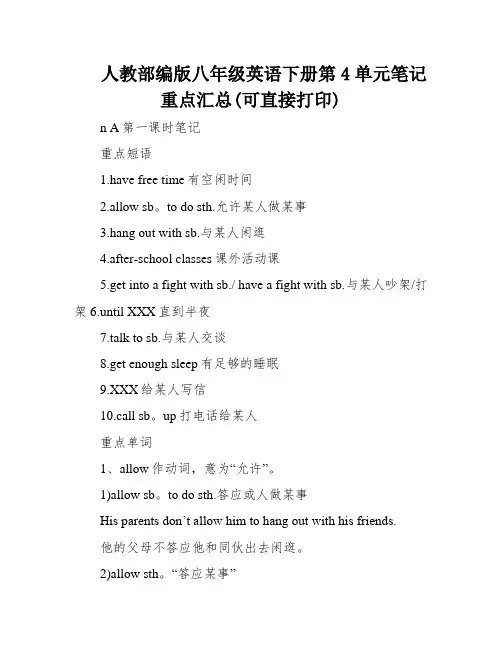
人教部编版八年级英语下册第4单元笔记重点汇总(可直接打印)n A第一课时笔记重点短语1.have free time有空闲时间2.allow sb。
to do sth.允许某人做某事3.hang out with sb.与某人闲逛4.after-school classes课外活动课5.get into a fight with sb./ have a fight with sb.与某人吵架/打架6.until XXX直到半夜7.talk to sb.与某人交谈8.get enough sleep有足够的睡眠9.XXX给某人写信10.call sb。
up打电话给某人重点单词1、allow作动词,意为“允许”。
1)allow sb。
to do sth.答应或人做某事His parents don’t allow him to hang out with his friends.他的父母不答应他和同伙出去闲逛。
2)allow sth。
“答应某事”I don't think she will allow it.我想她不会允许这件事情。
3)allow XXX.“允许做某事”XXX.在我们家不允许抽烟。
4)XXX.“被答应做某事”Passengers are not allowed to smoke on the bus.在公交车上,乘客不允许抽烟。
2、XXX.发觉或人在做某事其中的doing(现在分词)作宾语补足语。
类似的还有: XXX。
意为“看到/窥察到XXX听到XXX留意到XXX觉得或人在做某事”。
3、词语辨析:太多:too much+不可数名词例:too much homework太多功课太多:too many +可数名词复数例:too many people太多人太:much too+副词或形容词例:much too salty太咸重点句型1、What’s wrong with。
意为“……怎样了?”相当于What’s the matter with。
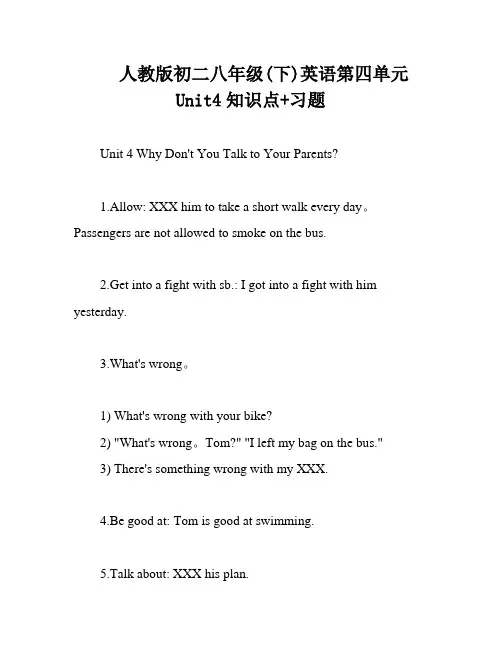
人教版初二八年级(下)英语第四单元Unit4知识点+习题Unit 4 Why Don't You Talk to Your Parents?1.Allow: XXX him to take a short walk every day。
Passengers are not allowed to smoke on the bus.2.Get into a fight with sb.: I got into a fight with him yesterday.3.What's wrong。
1) What's wrong with your bike?2) "What's wrong。
Tom?" "I left my bag on the bus."3) There's something wrong with my XXX.4.Be good at: Tom is good at swimming.5.Talk about: XXX his plan.6.On the phone。
on the。
on the。
on TV.7.XXX.: Yesterday。
XXX.25.当他害怕犯错误时,他会不敢去做某事,或者害怕某人/某事物/做某事。
26.我不会再抄他的作业了。
27.压力等同于压力,会让某人感到压力。
28.竞争:动词,与某人在某事上竞争。
竞争,竞争者。
她将参加这个舞蹈比赛。
29.XXX喜欢中国食物。
30.删除,剪下,例如:你最好删掉前两句话。
我从报纸上剪下了一篇文章。
31.在某事上获得成功,例如:她成功找到了一份工作。
32.当比赛结束时,我才会去睡觉。
当警察到达时,XXX 才离开她的办公室。
33.快速的,迅速的等同于快速的。
It's time to have XXX。
XXX went on for two minutes。
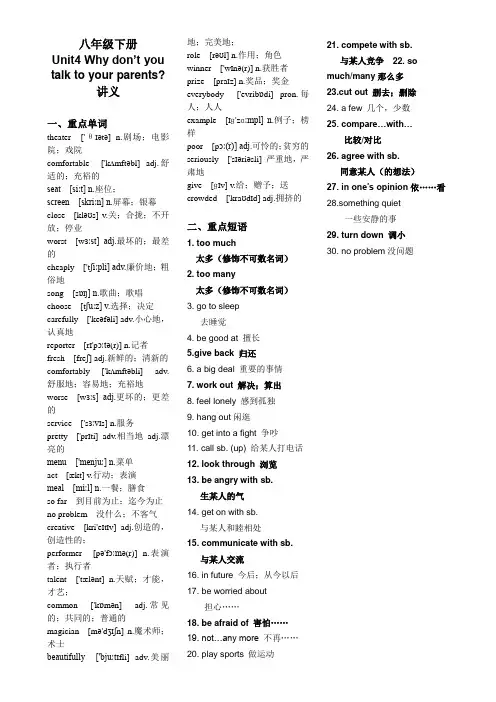
八年级下册Unit4 Why don’t you talk to your parents?讲义一、重点单词theater ['θɪətə] n.剧场;电影院;戏院comfortable ['kʌmftəbl] adj.舒适的;充裕的seat [siːt] n.座位;screen [skriːn] n.屏幕;银幕close [kləʊs] v.关;合拢;不开放;停业worst [wɜːst] adj.最坏的;最差的cheaply ['tʃiːpli] adv.廉价地;粗俗地song [sɒŋ] n.歌曲;歌唱choose [tʃuːz] v.选择;决定carefully ['keəfəli] adv.小心地,认真地reporter [rɪ'pɔːtə(r)] n.记者fresh [freʃ] adj.新鲜的;清新的comfortably ['kʌmftəbli] adv.舒服地;容易地;充裕地worse [wɜːs] adj.更坏的;更差的service ['sɜːvɪs] n.服务pretty ['prɪti] adv.相当地adj.漂亮的menu ['menjuː] n.菜单act [ækt] v.行动;表演meal [miːl] n.一餐;膳食so far 到目前为止;迄今为止no problem 没什么;不客气creative [kri'eɪtɪv] adj.创造的,创造性的;performer [pə'fɔːmə(r)] n.表演者;执行者talent ['tælənt] n.天赋;才能,才艺;common ['kɒmən] adj.常见的;共同的;普通的magician [mə'dʒɪʃn] n.魔术师;术士地;完美地;role [rəʊl] n.作用;角色winner ['wɪnə(r)] n.获胜者prize [praɪz] n.奖品;奖金everybody ['evribɒdi] pron.每人;人人example [ɪɡ'zɑːmpl] n.例子;榜样poor [pɔː(r)] adj.可怜的;贫穷的seriously ['sɪəriəsli] 严重地,严肃地give [ɡɪv] v.给;赠予;送crowded ['kraʊdɪd] adj.拥挤的二、重点短语1. too much太多(修饰不可数名词)2. too many太多(修饰不可数名词)3. go to sleep去睡觉4. be good at 擅长5.give back 归还6. a big deal 重要的事情7. work out 解决;算出8. feel lonely 感到孤独9. hang out闲逛10. get into a fight 争吵11. call sb. (up) 给某人打电话12. look through 浏览13. be angry with sb.生某人的气14. get on with sb.与某人和睦相处15. communicate with sb.与某人交流16. in future 今后;从今以后17. be worried about担心……18. be afraid of 害怕……19. not…any more 不再……21. compete with sb.与某人竞争22. somuch/many那么多23.cut out 删去;删除24. a few 几个,少数25. compare…with…比较/对比26. agree with sb.同意某人(的想法)27. in one’s opinion依……看28.something quiet一些安静的事29. turn down 调小30. no problem没问题三、重要词汇、短语、句子解析1. My parents don’t allow me to hang out with my friends. ★我的父母不允许我和我的朋友们出去闲逛。
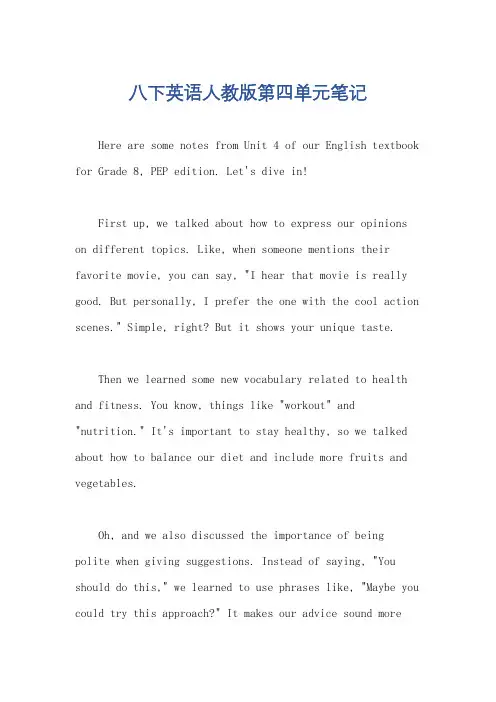
八下英语人教版第四单元笔记Here are some notes from Unit 4 of our English textbook for Grade 8, PEP edition. Let's dive in!First up, we talked about how to express our opinions on different topics. Like, when someone mentions their favorite movie, you can say, "I hear that movie is really good. But personally, I prefer the one with the cool action scenes." Simple, right? But it shows your unique taste.Then we learned some new vocabulary related to health and fitness. You know, things like "workout" and "nutrition." It's important to stay healthy, so we talked about how to balance our diet and include more fruits and vegetables.Oh, and we also discussed the importance of beingpolite when giving suggestions. Instead of saying, "You should do this," we learned to use phrases like, "Maybe you could try this approach?" It makes our advice sound moreconsiderate.And let's not forget about the fun part role-playing! We practiced having conversations about different scenarios, like asking for directions or making plans with friends. It was a great way to practice our speaking skills.Lastly, we touched on the topic of dealing with stress. We learned that everyone feels stressed sometimes, but it's important to find healthy ways to cope with it. Like, doing something you enjoy or talking to a friend.So that's a quick overview of what we covered in Unit 4. Hopefully, these notes will help you remember the keypoints!。
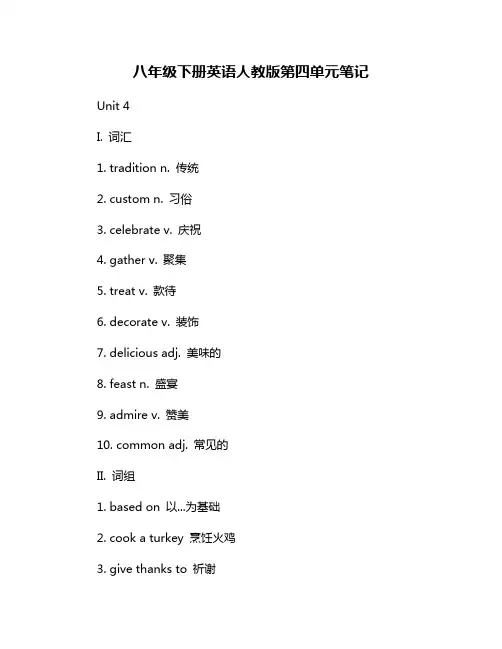
八年级下册英语人教版第四单元笔记Unit 4I. 词汇1. tradition n. 传统2. custom n. 习俗3. celebrate v. 庆祝4. gather v. 聚集5. treat v. 款待6. decorate v. 装饰7. delicious adj. 美味的8. feast n. 盛宴9. admire v. 赞美10. common adj. 常见的II. 词组1. based on 以...为基础2. cook a turkey 烹饪火鸡3. give thanks to 祈谢4. fall down 跌倒5. in memory of 纪念6. make a wish 许愿III. 语法1. 被动语态:主动语态和被动语态的构成及应用。
2. 情态动词should:表示建议、规定、习俯等用法。
3. if引导的条件状语从句:if引导的条件状语从句的用法。
IV. 作文1. My Favorite FestivalWrite an article about your favorite festival, introducing its customs, traditions, and what you like the most about it.V. 阅读理解Every culture has its own set of unique traditions and customs. Here are a few customs from around the world:1. In Japan, people celebrate Hanami, which is a festival to admire cherry blossoms in the spring.2. In Mexico, Day of the Dead is a holiday where families gather to remember and honor deceased loved ones.3. In India, Diwali is a festival of lights where people decorate their homes with candles and lamps.4. In the United States, Thanksgiving is a holiday where families come together to feast and give thanks for the blessings of the past year.VI. 交际用语1. How was your weekend?2. What did you do for Christmas?3. Did you have a good time at the party?4. How do you celebrate New Year's Eve?5. Have you ever tried traditional Chinese food?VII. 课外阅读Read a short story or article about a cultural festival from another country, and write a summary of what you learned.VIII. 练习Complete the sentences with the correct form of the verbs in brackets:1. They __________ (decorate) the Christmas tree last night.2. The turkey __________ (cook) by Sarah for Thanksgiving dinner.3. Diwali __________ (celebrate) in India with fireworks and lights.4. Day of the Dead __________ (remember) loved ones who have passed away.IX. 国际交流Share with a partner about a traditional festival from your culture and ask them about a festival from their culture. Discuss the customs, traditions, and similarities/differences between the two festivals.X. 课堂表现Participate actively in class discussions, ask questions, and share your thoughts on different cultural festivals. Take notes on new vocabulary and grammar structures learned in this unit.以上为八年级下册英语人教版第四单元的笔记内容,希會能对您有所帮助。
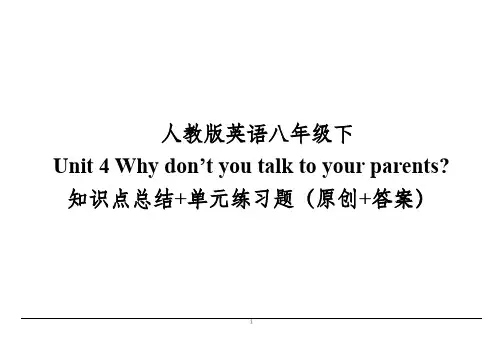
人教版英语八年级下Unit 4 Why don’t you talk to your parents?知识点总结+单元练习题(原创+答案)1一.重点词组:1.what’s wrong 哪不舒服?what’s wrong with sb 某人怎么了?2.look through 快速查看,浏览look up 查询look for 寻找look after 照顾look out = watch out 当心3.big deal 重要的事it’s not a big deal 不是要紧的事4.work out = figure out 解决,弄明白5.not...anymore 再也不6.cut out 删去pare...with 比较8.in one’s opinion 在某人看来9.hang out with sb 和某人闲逛10.after-school class 校外辅导课11.get into fight with sb 和某人打起来12.be angry with sb 对某人生气13.why don’t you do = why not do sth 为什么不做某事14.get on with sb 和某人相处得好15.be nice to sb 对某人友好16.mind sb doing sth 介意某人做某事17.on weekends 在周末二.重点单词1.allow v 允许allow doing sth 允许做某事allow sb to do sth 允许某人做某事sb is allowed to do sth 某人被允许去做某事2.guess v/n 猜have a guess = take a guess 猜一猜guess what? 您猜怎么着?3.deal v 处理;n 交易deal with sth 处理... = handle sth4.relation n 关系relative adj 相对的;n 亲戚relationship n 关系be related to sth 与...有关munication n 交流communicate v 交流6.argue v 争吵argue with sb 和某人争吵argument n 论点7.cloud n 云朵clouds 乌云8.instead adv 反而用法1:放在句首使用:She isn’t allowed to go out at this time of night. Instead, she should do her homework in her bedroom.用法2: 放在句尾连起来使用:She isn’t allowed to go out at this time of night. She should do her homework in her bedroom instead.instead of + 名词性短语9.nervous adj 焦虑的be nervous of/about sth10.offer v/n2offer sb sthprovide sth for sb = provide sb with sth supply sth for sb = supply sb with sth 11.proper adj 恰当的improper adj 不恰当的suitable adj 恰当的12.explain v 解释explanation n 解释13.clear adj 清晰的a clear day 晴天crystal clear 一清二楚的14.return v 返回return back 返还return to sb 还给某人15.member n 成员membership n 会员资格16.pressure n (物理)压力release pressure 释放压力stress (精神)压力reduce stress 减少压力pete v 竞争compete against sb 与某人竞争、攀比competition n 比赛competitive adj 竞争激烈的,好竞争的competent adj 有能力的,能胜任的18.skill n 技巧19.typical adj 典型的20.football n 美式橄榄球soccer 英式足球21.continue v 继续22.crazy adj 疯狂的be crazy about sth 对...感到痴狂23.push v 推push-up 俯卧撑pull v 拉24.develop v 发展development n 发展25.cause v 造成;n 原因cause sb to do sth 引起某人去做某事ual adj 平常的as usual 像往常一样27.perhaps adv 或许probably adv 或许possibly adv 或许34Unit 4 单元练习题一.重点词组考察二.重点单词考察三.课文翻译1. I have _____ _____ (太多) homework so I don’t have enough sleep.2. My parent don’t _____ _____ _____(允许我) hang out with my friends.3. I have _____ _____ (太多) after-school classes.4. I _____ _____ (陷入) a fight with my best friend.5. _____ _____ _____ (你为什么不)go to sleep earlier this evening?6. The house is _____ _____ (已经相当) clean and tidy.7. I found my sister _____ _____ (翻找) my things yesterday. 8. I guess you could tell her _____ _____ _____(去道歉).9. My problem is that I can’t _____ _____ _____ (和某人相处) my family. 10. My _____ _____ (大哥) is not very nice to me.11. He always _____ _____(拒绝) let me watch my favorite TV show. 12. It’s not easy _____ _____ _____ (处于你这个年龄). 13. You should _____ _____ _____ (提供去帮助).14. You don’t _____ _____ _____ _____ _____ _____ _____ (介意他一直在看电视).15. My sister borrows my clothes _____ _____ (没有问). 16. I am _____ _____ (担心) my school grades.17. You should tell him that _____ _____ _____ (抄别人的作业) is wrong. 18. _____ _____ _____ (他们中的许多人) are learning exam shills so that they can get into a good high school.19. They are always _____ _____ _____ (把他们和...做对比) other children.四.单项选择1.We can’t take this away until she _____ yes.A.will sayB. sayC. saysD. said2.She finally agrees with us _____ she did not like the plan at the beginning.A.ifB. unlessC. althoughD. when3.---Thanks for your sincere suggestion.---It’s my pleasure. Hope things _____.A.work outB. look outC. try outD. find out4.We are not allowed _____ or drink in the classroom.A.eatB. to eatC. eatingD. eaten5.The little boy _____ his book to the girl.A.providesB. suppliesC. bringsD. offers6.---Young people are always talking on their phones.---Yes, indeed. They should put down their phones and talk to people around them _____.A.stillB. eitherC. tooD. instead7.My _____ sister is three years _____ than me..A.elder; olderB. elder; elderC. older; elderD. older; older8.They didn’t leave for home _____ they finish their work.A.untilB. ifC. unless9.Chinese parents tend to compare their children _____ other kids.A.forB. toC. byD. with10.Do you mind me _____ the radio? It’s too noisy.A.turning upB. turning onC. turning downD. turn down11.Gloria offers _____ us prepare for the exams.A.helpB. to helpC. helpingD. helped12.Did you watch the TV show _____ the evening of August 24th?---Yes, I did. _____ my opinion, it’s wonderful.A.in, InB. in; OnC.on; OnD. on, In五.完形填空As though things weren’t 1._____ enough last spring, a wild turkey started showing up on my block. It’s normally one of the busiest intersections in Minneapolis, but this turkey walked down the sidewalk day after day 2._____ she belonged. As word 3._____ about her, more and more people came out to see her. A young woman told me that they had named her Tina—Tina the Turkey. Tina must have been 4._____ eggs in front of the neighbors’ house. She would sit and wiggle her rump in the same place in their yard every day. One day she walked with five other 5._____ through the parking lot, 6.______ the two-and-a-half-foot cement wall, and into the yard. I watched in surprise—six wild turkeys! One had her feathers ruffled; I think it must have been Tina. This was her 7._____ now. There were many days when Tina would stand in the parking lot—a dangerous place for a 8._____ bird—and refuse to move, blocking cars from coming or going. This became a show with Tina in the starring role until the day a new character appeared on stage: an strange-looking man with black hair. He looked 9._____. He was covered in dirt, his posture stiff. He approached Tina and began to strike curious poses in a beautiful dance. Tina 10._____ him in this dance. Together, they were art in motion. And because of the stay-at-home order, I got to see them. I’ll always remember this turkey when I think back on the corona-virus pandemic. She brought a lot of joy to a community at a time when people desperately needed an escape.1.A. funny B. strange C. wonderful D. humorous2.A. as if B. if C. even if D. even though3.A. gave out B. handed out C. set out D. got out4.A. lying B. laying C. lied D. laid5.A. neighbors B. places C. turkeys D. women6.A. on B. up C. in D. with7.A. place B. turkey C. right D. wall8.A. fat B. strong C. powerful D. slow-moving9.A. homeless B. hopeless C. strange D. careful510.A. embraced B. joined C. welcomed D. invited 答案:一.重点词组1.what’s wrong with sb2.look through3.look for4.big deal5.look out6.work out7.not ... anymore8.cut outpare ... with ...10.hang out with sb11.after-school class12.in one’s opinion13.get into fight with sb14.be angry at sb15.be friendly to/with sb16.on weekends17.sllow doing sth18.allow sb to do sth19.be allowed to do sth20.guess what21.a clear day22.crystal clear23.return back24.return to sb25.be crazy about26.cause sb to do sth27.as usualpete with/against29.help with sth630.reduce stress; release pressure31.be related to32.find sb doing sth二.重点单词1.relation2.relativemunication; communicate4.argument5.clouds6.continue7.anyway8.proper; improper9.sick; ill10.member11.membership12.neighborhood13.typical三.课文翻译1.too much2.allow me to3.too many4.get into5.Why don’t you6.already pretty7.looking through8.to say sorry9.get on with10.elder brother11.refuses to12.being your age13.offer to help14.mind him watching TV all the time15.without asking16.worried about17.copying others’ homework18.Many of thempare them with四.单项选择1-5 CCABD5-10 DAADC11-12 BD五.完形填空1-5 BADBC6-10 BADAB7。
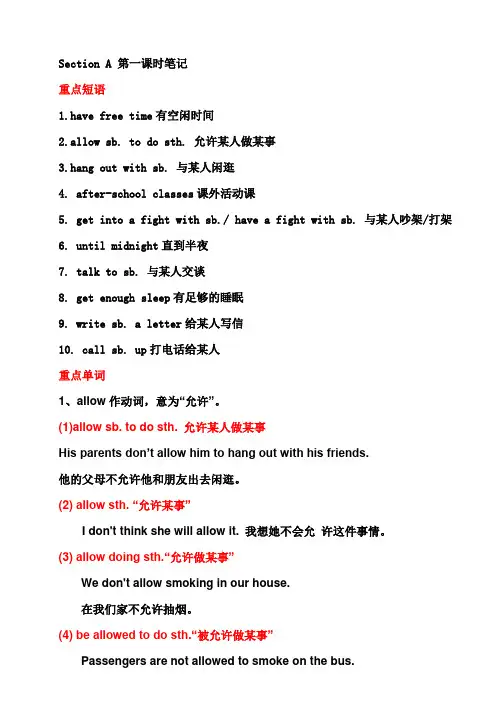
Section A 第一课时笔记重点短语1.have free time有空闲时间2.allow sb. to do sth. 允许某人做某事3.hang out with sb. 与某人闲逛4. after-school classes课外活动课5. get into a fight with sb./ have a fight with sb. 与某人吵架/打架6. until midnight直到半夜7. talk to sb. 与某人交谈8. get enough sleep有足够的睡眠9. write sb. a letter给某人写信10. call sb. up打电话给某人重点单词1、allow作动词,意为“允许”。
(1)allow sb. to do sth. 允许某人做某事His parents don’t allow him to hang out with his friends.他的父母不允许他和朋友出去闲逛。
(2) allow sth. “允许某事”I don't think she will allow it. 我想她不会允许这件事情。
(3) allow doing sth.“允许做某事”We don't allow smoking in our house.在我们家不允许抽烟。
(4) be allowed to do sth.“被允许做某事”Passengers are not allowed to smoke on the bus.在公交车上,乘客不允许抽烟。
2、find sb. doing sth. 发现某人在做某事其中的doing(现在分词)作宾语补足语。
类似的还有: see/watch/hear/notice/feel sb. doing sth. ,意为“看到/观察到/听到/注意到/感觉某人在做某事”。
3、词语辨析:太多:too much+ 不可数名词例:too much homework太多作业太多:too many + 可数名词复数例:too many people太多人太: much too+ 副词或形容词例:much too salty 太咸重点句型1、What’s wrong with. . . ? 意为“……怎么了? ”相当于What’s the matter with. . . ?2、表建议的句型:(1)你为什么不……Why don't you +V原? = Why not +V原例:Why don’t you talk to your parents.=Why not talk to your parents.(2)你应该/可以…You should/could +v.(3)你最好(不)…You’d better (not) +v.(4)你介意….. Would you mind doing…?(5)……怎么样?What about…? =How about…?(6)你认为……怎么样?What do you think of…? = How do you like…? Section A 第二课时笔记重点短语1. look through快速查看;浏览2. be angry with sb. 生某人的气3. a big deal重要的事4. work out成功地发展;解决5. get on with = get along with和睦相处,关系良好6. fight a lot经常吵架/打架7. hang over笼罩8. refuse to do sth. 拒绝做某事9. offer to do sth. 主动提出做某事10. be nice to sb.”对某人友好”相当于be friendly/good/kind to sb.11. mind sb. doing sth. 介意某人做某事12. in future今后13. make sb. angry使某人生气14. worry about sth. 担心某事重点单词1.(1)fight做名词:get into a fight with sb.=have a fight with sb. 与某人吵架/打架(2)做fight 动词:fight with sb. 与某人吵架/打架2. argueargue作动词,意为“争论,争吵”。
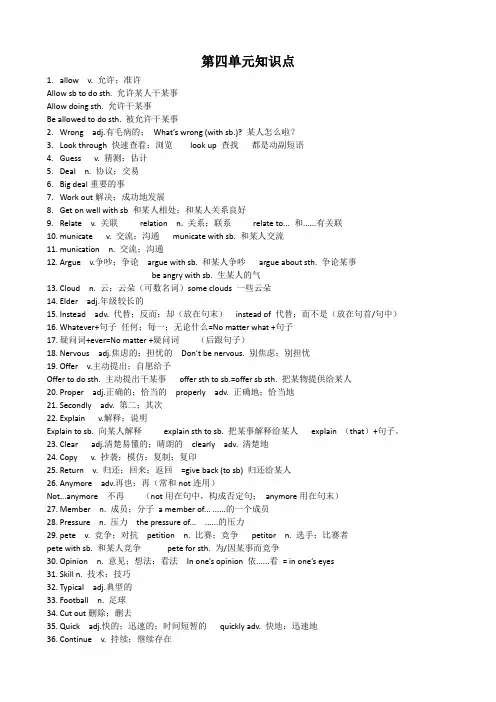
第四单元知识点1.allow v. 允许;准许Allow sb to do sth. 允许某人干某事Allow doing sth. 允许干某事Be allowed to do sth. 被允许干某事2.Wrong adj.有毛病的;What’s wrong (with sb.)? 某人怎么啦?3.Look through 快速查看;浏览look up 查找都是动副短语4.Guess v. 猜测;估计5.Deal n. 协议;交易6.Big deal重要的事7.Work out解决;成功地发展8.Get on well with sb 和某人相处;和某人关系良好9.Relate v. 关联relation n. 关系;联系relate to... 和......有关联10.municate v. 交流;沟通municate with sb. 和某人交流11.munication n. 交流;沟通12.Argue v.争吵;争论argue with sb. 和某人争吵argue about sth. 争论某事be angry with sb. 生某人的气13.Cloud n. 云;云朵(可数名词)some clouds 一些云朵14.Elder adj.年级较长的15.Instead adv. 代替;反而;却(放在句末)instead of 代替;而不是(放在句首/句中)16.Whatever+句子任何;每一;无论什么=No matter what +句子17.疑问词+ever=No matter +疑问词(后跟句子)18.Nervous adj.焦虑的;担忧的Don’t be nervous. 别焦虑;别担忧19.Offer v.主动提出;自愿给予Offer to do sth. 主动提出干某事offer sth to sb.=offer sb sth. 把某物提供给某人20.Proper adj.正确的;恰当的properly adv. 正确地;恰当地21.Secondly adv. 第二;其次22.Explain v.解释;说明Explain to sb. 向某人解释explain sth to sb. 把某事解释给某人explain (that)+句子。
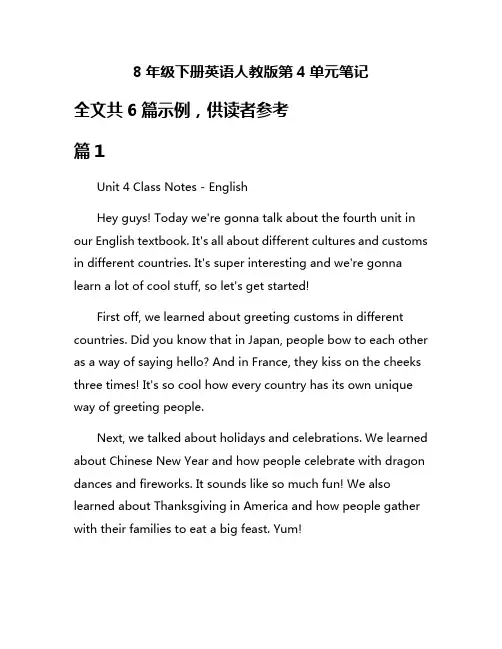
8年级下册英语人教版第4单元笔记全文共6篇示例,供读者参考篇1Unit 4 Class Notes - EnglishHey guys! Today we're gonna talk about the fourth unit in our English textbook. It's all about different cultures and customs in different countries. It's super interesting and we're gonna learn a lot of cool stuff, so let's get started!First off, we learned about greeting customs in different countries. Did you know that in Japan, people bow to each other as a way of saying hello? And in France, they kiss on the cheeks three times! It's so cool how every country has its own unique way of greeting people.Next, we talked about holidays and celebrations. We learned about Chinese New Year and how people celebrate with dragon dances and fireworks. It sounds like so much fun! We also learned about Thanksgiving in America and how people gather with their families to eat a big feast. Yum!Then, we studied different types of food from around the world. We learned about sushi from Japan, pasta from Italy, and curry from India. I'm getting hungry just thinking about it! It's amazing how food can bring people together and help us learn about different cultures.Lastly, we learned about traditional clothing in different countries. We talked about kimonos from Japan, saris from India, and hanboks from Korea. It's so cool to see all the colorful and beautiful outfits that people wear in different parts of the world.Overall, this unit was so fun and interesting. I loved learning about different cultures and customs, and I can't wait to travel the world and experience them for myself one day. Thanks for reading my class notes, see you next time!篇2Unit 4 My English TeacherHey everyone! Today, I want to share with you all about our English teacher in the 8th grade. Her name is Miss Lily, and she is the best English teacher ever!First of all, Miss Lily is super nice and friendly. She always greets us with a big smile and asks us how we are doing. Shemakes learning English fun by playing games, singing songs, and even watching English movies together. We never get bored in her class!Secondly, Miss Lily is a great teacher because she is very patient with us. Whenever we have trouble understanding something, she explains it to us in a clear and simple way. She never gets mad at us for making mistakes and always encourages us to keep trying our best.Moreover, Miss Lily is really good at teaching us new words and grammar rules. She uses a lot of visual aids and examples to help us understand. She also gives us plenty of exercises and homework to practice what we have learned in class.In addition, Miss Lily is very supportive of us. She always praises us when we do well and helps us when we are struggling. She is like a friend to us, someone we can trust and rely on.In conclusion, I am so grateful to have Miss Lily as my English teacher. She makes learning English exciting and enjoyable. I hope all of you have a teacher like her too!That's all for today's English class notes. See you next time!篇3Unit 4 My DayHey guys! Today I want to share with you my notes from Unit 4 of our 8th grade English textbook. This unit is all about talking about our daily routines. Let's get started!In the morning, I usually wake up at 6:30 a.m. Then, I brush my teeth and wash my face. After that, I have breakfast with my family. I love eating cereal and drinking orange juice!At 7:30 a.m., I leave for school. I walk to the bus stop and take the school bus with my friends. We chat and laugh all the way to school.In the classroom, we have different subjects like math, English, science, and history. My favorite subject is English because I love reading and writing stories.During lunchtime, my friends and I eat together in the cafeteria. We talk about our favorite TV shows and play games on our phones.After school, I usually have soccer practice. I love playing sports and hanging out with my teammates. It's so much fun!When I get home, I do my homework and study for exams. Sometimes, I watch TV or play video games with my siblings before dinner.At night, I take a shower, read a book, and go to bed around 9:00 p.m. I like to listen to music before falling asleep.That's a typical day in my life. I hope you enjoyed reading my notes from Unit 4! Let's keep learning and improving together. See you next time!篇4Unit 4 My homeHi everyone! Today I'm gonna talk about the 8th grade unit 4 English notes. This unit is all about different types of houses and homes, so let's get started!First, we learned about the different types of houses like apartments, villas, and cottages. Apartments are tall buildings with lots of homes inside. Villas are big houses with gardens and swimming pools. Cottages are small houses in the countryside. It's really cool to know about all these different types of houses!Next, we learned about the rooms in a house. There are lots of rooms like the living room, bedroom, kitchen, bathroom, and so on. Each room has different furniture and things in it. For example, the living room has a sofa and TV, the bedroom has abed and wardrobe, and the kitchen has a stove and fridge. It's fun to imagine what our dream house would look like!We also talked about furniture and appliances in the house. We learned the names of different furniture like table, chair, and bookshelf. We also learned about appliances like washing machine, microwave, and dishwasher. It's interesting to know how these things make our lives easier at home.In this unit, we also learned about giving directions to a place. We practiced using prepositions like "next to", "in front of", and "between" to describe where things are located. It's important to know how to give directions so we don't get lost!Overall, this unit was really fun and we learned a lot about houses and homes. I can't wait to use everything we learned in this unit in real life. See you next time! Bye-bye!篇5Unit 4 My DayHey guys! Today I'm gonna share with you some of the notes I took from our English class. We talked about our daily routines in Unit 4, and I learned a lot of new words and phrases. So let me break it down for you!First off, we learned how to talk about different activities we do during the day. For example, in the morning, I usually wake up, brush my teeth, and have breakfast. Then I go to school and have classes until the afternoon. After school, I might play some sports or do homework. In the evening, I have dinner with my family and then relax before bed.We also learned about time words like "morning", "afternoon", and "evening", to help us talk about when we do things. It's important to know these words so we can describe our daily routines clearly.Next, we practiced using the present simple tense to talk about habits and routines. For example, I play basketball every Saturday, or I watch TV before bedtime. It's easy once you get the hang of it!We also learned about adverbs of frequency like "always", "often", "sometimes", or "never". These words help us talk about how often we do things. For example, I always brush my teeth before bed, but I never eat vegetables.Overall, I had a lot of fun learning about daily routines in Unit 4. It's cool to be able to talk about our day in English! I hope you guys found these notes helpful too. Keep practicing and see you next time!篇6Hello everyone, I'm going to share with you my notes from Unit 4 in the 8th grade English textbook. This unit is all about animals, so it's super fun and interesting!First, we learned about different kinds of animals and their habitats. For example, we talked about lions living in the savanna and polar bears in the Arctic. It was so cool to learn about where animals live and how they adapt to their environments.Next, we studied the importance of protecting endangered species. We learned about how some animals, like pandas and tigers, are in danger of becoming extinct. It's really sad to think about them disappearing forever, so we talked about ways to help save them, like donating to wildlife conservation organizations and spreading awareness.We also discussed the relationship between humans and animals. We talked about how some animals are used for work or as pets, and how we should treat them with respect and kindness. Animals are our friends, so we should always be mindful of how we interact with them.Overall, I had a lot of fun learning about animals in this unit. I hope we can all work together to protect and care for our furryand feathered friends. Let's be good stewards of the Earth and make sure all animals can live happy and healthy lives. Thanks for listening to my notes!。
八年级英语下册Unit4Grammar预习指导一、知识点一、语法:(一)until, so that和although/though的用法1.Until “直到...为止”用来引导时间状语从句Not...until... “直到...才...”Eg: She did her homework until 12:00 pm last night.她昨晚作业做到半夜12点。
She didn’t go to bed until her mother came back.直到她妈妈回来她才去睡觉。
2.So that “以便;为了”用来引导目的状语从句So...that...“如此...以至于...”Eg: She got up early so that she can catch the first bus.她起得早为了可以赶上头班车。
She is so young that she can’t look after herself.她如此小以至于不能照顾自己。
3.Although/though “虽然;即便;尽管”用来引导让步状语从句(不能与but连用)Eg: Although it rained heavily, they still went to the movies.尽管雨下得很大,他们仍然去看电影。
(二)提建议的常用表达1.Why don’t you do sth.? 你为什么不做...呢?2.What/How about doing sth.? 做某事怎么样?3.Let’s do sth. 让我们做...吧!4.You should (not) do sth. 你(不)应该做...。
5.You’d better (not) do sth. 你最好(不)做某事6.Would you like to do sth. 你愿意做某事吗?7.Shall we do sth.? 我们应该做某事吗?8.You could do sth. 你可能做某事。
八下Unit 4一、词汇拓展1.pressure (n.) — ___________ (n. 近义词) — ____________ (v. 按,压)pete (v.) — _____________ (n. 比赛) — _____________ (n. 竞争者) — ___________ (adj. 有竞争力的)3.opinion (n.) — ____________ (近义词)4.skill (n.) — _________ (adj 熟练的)5.typical (adj.) — _____________ (adv. 典型地)6.quick (adj.) — ____________ (adv. 快) — __________ (近义词)7.push (v.) — __________ (反义词)8.normal adj. — ____________________adv. — ____________________(反义词)二、重点句型1.他们很快地吃完晚饭,然后就到了做家庭作业的时间了。
They have a quick dinner,and then it's time for homework.2.人们不该把自己的孩子逼得太紧。
People shouldn't push their kids so hard.3.而且他们总是把自己的孩子和其他的孩子进行比较。
And they are always comparing them with other children.4.虽然想让孩子成功是正常的,但是拥有快乐的孩子更重要。
Although it's normal to want successful children,it's even more important to have happy children.三、重难点知识练习1.allow2.instead3.look4.deal5.argue6.until7.not…anymore8.return9.whatever10.explain explanation知识点练习1.allowThe persons under 18 years old shouldn’t to the bar.A.allow goingB. allowed to goC. be allowed to goD. be allow to go2.instead adv.代替,反而,却What a nice day! Let’s go sightseeing watching TV in the hotel. A. because of B. out of C. instead of D. together with3.lookIf you don’t know about the word , you can ________it ________in the dictionary. She _____________the window but saw nothing.4.deal dealt dealingShe doesn’t know how to deal with these old books.She doesn’t know ______to do with these old books.5.argue v.争论---argument n.争论如果你们争执不休,最好的方式就是保持沉默。
Unit 4 Why don't you talk to your parents?★★必背单词return .回来;回去relation .关系;联系;交往instead .代替;反而;却allow .允许;准许compete .竞争,对抗cause .造成;引起communicate .交流;沟通explain .解释;说明★要求会认的单词copy .复制;复印member .成员;分子guess .猜测;估计whatever .任何;每一nervous .焦虑的;担忧的proper .正确地;恰当地skill .技艺;技巧★★★必背短语1. compare…with… 比较;对比2. a waste of 浪费3. allow doing sth 允许做某事allow sb. to do sth 允许某人做某事be allowed to do sth 被允许做某事4. find sb. doing sth 发现某人正在做某事(类似动词:hear,watch, see, feel)5. argue with sb. about sth 为某事与某人争吵argue about sth 争论某事argue against 争辩;反对6. refuse to do sth拒绝去做某事7. explain sth to sb. 向某人解释某事explain to sb sth给某人解释某事8. succeed in doing sth9. in one’s opinion 以某人的观点;在某人看来10.so that 为了not.....until直到……才★★★知识点:1. 与look相关的短语:look for寻找look after=take care of照顾look like看起来像look the same看起来一样look over复习look through浏览look up查阅look forward to期望2. 【解析】hope VS hope希望hope to do sth 例:I hope to visit Guilin.hope + that 从句(表示希望)例:I hope that you’ll be better soonwish v 希望wish to do sth 例:I wish to visit Guilin.wish sb.to do sth 希望某人做某事例:I wish you to go.wish +that 从句表示愿望,从句用虚拟语气例:I wish I were you.3【拓展】although/however辨析⑴although conj,“虽然;即使;纵然”,引导让步状语从句时放在主句前后都可。
1八年级下册Unit 4He said I was hard-working单元笔记【单元目标】【词汇学习】1.mad adj.极为生气的;非常恼火的She was mad with me for losing my keys.她为我丢了钥匙而生我的气。
2.anymore adv.再;还(用于否定句)He doesn't come here anymore.他再也不到这儿来了。
3.however adv.无论如何He can answer the question however hard it is.不管问题有多难他都能回答。
4.suppose v.假定;认为;料想;期望What do you suppose you will do after school? 你放学后想干什么?5.nervous adj.惊慌的;神经质的I felt very nervous when I went into his office.当我走进他的办公室时,我感到很惊慌。
6.semester n.一学期;半年We will have ten subjects in this semester.这个学期我们将学十门功课。
7.disappointing adj.令人悲观的Maybe this news is disappointing .或许这是一个令人悲观的消息。
8.be supposed to 认为必需;认为应当You are supposed to be successful.你应当胜利。
9.get mad 变疯;变得着迷She gets mad about going to dance.她对跳舞着了迷。
10.get over 复原,克服困难Can we get over this difficulty? 我们能克服这个困难吗?11. first of all 首先12. pass on 传递13. be supposed to 被期望或被要求……14. do better in 在......方面做得更好15. be in good health 身体健康16. report card 成果单17. get over克服;复原;宽恕18. open up 打开;开拓;开发;开放19. care for照料;照看20.have a party for sb.为某人实行一次聚会21.be mad at sb 对某人恼火,生气【重点句型分析】1. What are some soap operas you know? 你所知道的有哪些肥皂剧?you know是定语从句,修饰前面的名词soap operas2. What are some things that happen on soap operas?肥皂剧里发生了些什么事?That happen on soap operas 是定语从句,修饰前日面的名字something.2拉娜说她不再生玛西娅的气了。
八年级下册英语人教版第四单元笔记全文共6篇示例,供读者参考篇1Title: My Notes for Unit 4 in Grade 8 English TextbookHi guys! Today I'm going to share with you my notes for Unit 4 in our Grade 8 English textbook. I hope it can help you understand the lesson better. Let's get started!1. Vocabulary:- Adventure: an exciting or dangerous experience- Environment: the surroundings or conditions in which a person, animal, or plant lives- Wildlife: animals and plants that live in the wild- Glacier: a slowly moving mass of ice2. Grammar:- Present perfect tense: We use this tense to talk about an action that started in the past and continues into the present. For example, "I have seen that movie before."3. Reading:- The reading passage is about a group of students who went on an adventure trip to explore the environment and wildlife in a national park. They saw a glacier and learned about how it affects the environment.4. Listening:- In the listening task, we listened to a conversation between two friends who were discussing the importance of protecting the environment. They talked about the impact of pollution on wildlife.5. Writing:- The writing task asked us to write a short paragraph about our own adventure experience. I wrote about a trip to the beach where I saw dolphins swimming in the ocean.6. Speaking:- During the speaking activity, we worked in pairs to discuss what we can do to protect the environment. We came up with ideas like reducing plastic use and planting trees.I hope these notes are helpful for you guys! Remember to review the vocabulary, practice the grammar, and pay attention during the reading and listening tasks. Good luck with your studies! Let's ace this unit together!篇2Hey guys! Today I'm going to share with you the notes for Unit 4 in the 8th Grade English textbook. It's all about jobs and careers, so let's dive in!1. Jobs and Careers:- Jobs are things that people do to earn money. Some common jobs include teacher, doctor, police officer, chef, and firefighter.- Careers are the paths that people choose for their lives. You can have a career as a musician, athlete, scientist, or even a writer.2. Vocabulary:- Salary: The amount of money that you are paid for your job.- Qualifications: The skills and experience that you need for a job.- Application: A form that you fill out when you want to apply for a job.- Interview: A meeting where you talk to someone about getting a job.3. Work Experience:- It's important to gain work experience to help you decide what career you want to pursue. You can volunteer, do internships, or even work part-time while you're still in school.4. Famous People and Their Jobs:- There are many famous people who have interesting jobs. For example, Elon Musk is a CEO and founder of SpaceX and Tesla, Oprah Winfrey is a media mogul, and Serena Williams is a professional tennis player.5. Future Jobs:- The world is always changing, and new jobs are being created all the time. Some future jobs may include virtual reality designer, drone operator, or even space tour guide!Remember to study hard and think about what you want to be when you grow up. Your dream job is waiting for you! Have fun learning and exploring different career options. Good luck!篇3Unit 4: Our worldHello everyone! Today, I’m gonna tell you all about the super cool stuff we learned in the eighth grade English class, Unit 4. Buckle up 'cause we're gonna learn all about our world!First off, we learned about climate change. It's when the Earth's temperature goes up and causes crazy weather patterns. Like, the polar ice caps are melting and sea levels are rising. It's a big problem and we gotta do something about it!Next, we studied different types of pollution. Air pollution is when the air we breathe is dirty from cars and factories. Water pollution is when our lakes and rivers are full of yucky stuff. And land pollution is when our beautiful land is covered in trash. We need to recycle and be more careful about how we treat our planet!Then, we talked about endangered animals. These poor creatures are at risk of disappearing forever. We learned about efforts to protect them and how important it is to keep them safe. We can help by not buying products made from endangered animals and by supporting conservation efforts.Finally, we discussed ways to be more eco-friendly in our daily lives. Like using reusable bags, turning off lights when weleave a room, and planting trees. Small actions can make a big difference in saving our planet!So there you have it, folks! Unit 4 was all about our world and how we can make it a better place. Let's work together to protect our planet and all its amazing creatures. See you next time, friends!篇4Hello everyone! Today I'm going to share with you my notes from the fourth unit of the eighth grade English textbook. Let's dive right in!First up, we learned about different ways to express future actions, like using "be going to" or "will". For example, "I am going to visit my grandmother tomorrow" or "I will call you later." It's important to know when to use each one!Next, we talked about giving advice and making suggestions. It's important to use phrases like "You should" or "Why don't you" to offer helpful advice. For example, "You should eat more fruits and vegetables" or "Why don't you study for the test?"We also learned about the importance of using comparatives and superlatives when talking about things beingbigger, smaller, faster, or slower. For example, "This book is bigger than that one" or "She is the tallest girl in our class."Another key point we covered was how to describe daily routines using present simple tense. We can say things like "I wake up at 7 o'clock every morning" or "She goes to bed early on school nights." It's important to be able to talk about our daily habits and routines.Lastly, we learned about expressing wishes and regrets using the past simple tense. We can say things like "I wish I had studied harder for the exam" or "I regret not helping my friend when she needed me." It's important to be able to talk about things we wish we could change.Overall, it was a challenging but fun unit to study. I hope these notes help you better understand the material. Keep studying hard and practicing your English every day! Good luck, everyone!篇5Hello everyone! Today I'm going to share with you my notes from the 4th unit of the 8th grade English textbook. Let's dive right in!First, we learned about different ways to express past events. We can use the simple past tense to talk about actions that happened in the past, like "I played soccer yesterday." We also learned about the past continuous tense, which is used for actions that were happening in the past at a specific time, like "I was studying when my friend called."Next, we talked about different ways to give advice and make suggestions. We can use modal verbs like "should" and "could" to give advice, such as "You should go to bed early." We can also use phrases like "How about" and "Why don't we" to make suggestions, like "How about watching a movie tonight?"Then, we studied the use of reported speech. When we report what someone else said, we need to change the pronouns and tenses accordingly. For example, if someone said "I like ice cream", we can report it as "She said she liked ice cream."Finally, we learned about different ways to express future actions. We can use the simple future tense with "will" or "going to" to talk about future plans, like "I will visit my grandparents next week." We can also use the present continuous tense with future meaning to talk about fixed future arrangements, like "I am meeting my friends on Saturday."In conclusion, this unit was all about different ways to talk about past, present, and future events in English. By using the correct tenses and expressions, we can communicate more effectively and accurately. I hope these notes helped you understand the material better. Thanks for listening!篇6Unit 4 The Magic of DNAHey guys, it's time to learn about something super cool in our English class - DNA! We are in the eighth grade now, so we need to know more about this amazing thing that makes us who we are.First of all, what is DNA? Well, DNA stands for deoxyribonucleic acid. It's like a set of instructions that tells our bodies how to grow and function. It's like a recipe book for making us! And guess what? Every living thing, from plants to animals to humans, has DNA.DNA is made up of four nucleotides: adenine (A), thymine (T), guanine (G), and cytosine (C). These nucleotides are like letters in an alphabet, and they come together in a specific order to create our unique DNA code. Isn't that amazing?One really cool thing about DNA is that it can be passed down from generation to generation. That means we get some of our DNA from our parents, and they got some of theirs from their parents, and so on. It's like a family tree in our DNA!But here's the most exciting part - DNA is responsible for so many things about us, like our eye color, hair color, height, and even things like our personality traits. That's why we can sometimes see similarities between family members - it's all because of our DNA!Scientists have been studying DNA for a long time now, and they have found so many fascinating things about it. They can even use DNA to solve crimes or trace our ancestry! It's like a superpower hidden inside us.So, let's remember to appreciate the magic of DNA and how it makes us all special and unique. Who knows what other secrets DNA holds? Let's keep learning and exploring the wonders of science together!That's all for now, guys. See you in the next lesson! Bye-bye!。
Unit 4 Why don’t you talk to your parent?一、重点词汇1.municate _________(n.)2. argue _________(n.)3. cloud _________(adj.)4. old _________(比较级) 年长的5. second _________(adv.)6. explain _________(n.)7. press _________(n.)8. pete _________(n.)9. soccer _________(同义词)10. develop _________(n.)11. usually _________(adj.)12. quickly _________(adj.)二、短语1.cut out删除;删去2.pare…with… 把……和……作比较;对比3.in one's opinion依……看4.spend time alone独自消磨时光5.a lot of pressure许多压力6.free time activities业余活动7.the mon problem普遍问题8.give one's opinion about sth. 就某事给出某人的观点9.be important for sth.对某物重要10.not…until…直到……才……11.cause a lot of stress for sb. 给某人造成很多压力12.know about了解13.send sb. to…派某人去……14.push sb. so hard逼迫某人太紧15.too much pressure太多的压力16.think for oneself为某人自己着想17.keep on doing sth.一直做某事18.pete with sb.与某人竞争三、课文重点知识总结一、perhaps二、find三、Although四、Why don’t you五、offer六、be worried about七、opinion n 意见;想法;看法八、cut out 删除;删去(v+adv)九、It’s + adj.(easy,difficult,important,necessary) +(for sb.) to do sth讲解一、perhapsperhaps也许,可能”,一般指比较小的可能性。
八年级下册Unit 4He said I was hard-working单元笔记【单元目标】【词汇学习】1.mad adj.极为愤怒的;十分恼火的She was mad with me for losing my keys.她为我丢了钥匙而生我的气。
2.anymore adv.再;还(用于否定句)He doesn't come here anymore.他再也不到这儿来了。
3.however adv.无论如何He can answer the question however hard it is.不管问题有多难他都能回答。
4.suppose v.假定;认为;料想;期望What do you suppose you will do after school? 你放学后想干什么?5.nervous adj.紧张的;神经质的I felt very nervous when I went into his office.当我走进他的办公室时,我感到很紧张。
6.semester n.一学期;半年We will have ten subjects in this semester.这个学期我们将学十门功课。
7.disappointing adj.令人失望的Maybe this news is disappointing .也许这是一个令人失望的消息。
8.be supposed to 认为必须;认为应该You are supposed to be successful.你应该成功。
9.get mad 变疯;变得着迷She gets mad about going to dance.她对跳舞着了迷。
10.get over 恢复,克服困难Can we get over this difficulty? 我们能克服这个困难吗?11. first of all 首先12. pass on 传递13. be supposed to 被期望或被要求…… 14. do better in 在......方面做得更好15. be in good health 身体健康16. report card 成绩单17. get over克服;恢复;原谅18. open up 打开;开拓;开发;开放19. care for照料;照顾20.have a party for sb. 为某人举行一次聚会21.be mad at sb 对某人恼火,愤怒【重点句型分析】1. What are some soap operas you know? 你所知道的有哪些肥皂剧?you know是定语从句,修饰前面的名词soap operas2. What are some things that happen on soap operas?肥皂剧里发生了些什么事?That happen on soap operas 是定语从句,修饰前日面的名字something.. 拉娜说她不再生玛西娅的气了。
3. Lana said she wasn’t mad at Marcia anymorebe mad at (with) sb. 对某人恼火be mad at (about) sth. (doing sth.) 对某事恼火eg. Mother got mad at (with) me for watching TV for hours.(此处的got mad at = was mad at)not… anymore 不再…… 她不再哭了。
eg. She didn’t cry anymore.4. bring some books to her house. 给她带来一些书bring sth. to 从(远处)带来,拿来(到近处)而其反义词为:take… to“从(近处)拿(走)到(远处)eg. Could you bring some water to me?Please take the chair to Jim’s room.5.pass this message to sb.将这个消息(信息)传给某人pass on sth. to sb 把某物传递给某人eg. She said she would pass the dictionary to Tom.你想知道为什么C未将它还回来6.You want to know why C didn’t return it and where it is.并想知道它在哪里。
此句中why C didn’t return it and where it is是宾语从句作know的宾语,请注意宾语从句的语序。
(陈述语序)7.You were supposed to meet at the bus stop this morning to return it.你应该今早上在车站去见面并把它还给人家。
be supposed to do ……被期望,应该(做……)eg. He is supposed to be there on time.按理他应该准时到哪里。
【课文解读】tening.1. In English, I’m better at reading than lis在英语方面,我的阅读比听力更好。
的比较级,意思为“更擅长……” be better at doing (than doing)是be good at ……eg. Are they better at playing football than basketball?2. I can do better in math.在数学方面我能做得更好。
better 是well的比较级do well in 在…方面做得好 eg. Does she do well in physics?3. I finished my end –of –year exams last week. 我上周结束了期末考试。
finish doing stheg. Did he finish doing his homework before he went to bed?4. I had a really hard time with science this semester.这学期我的科学学科学得的确不好。
rk.抄袭别人的作业是不对的。
5. It’s not right to copy other’s homewo请记住这一句型:It’s right for sb to do … 6.I said I didn’t think it was a good idea for her to copy ma homework.我说我认为对她来说抄我的作业不是个好办法。
注意1:此句中的三个动词都是过去时,即时态的一致性注意 2:中英文语序(否定词的位置)的不同7. She said it was much better if she din her own work.她说如果她自己做作业就会好多了。
much +比较级,意思是“…得多” e.g. He runs much faster than I.8. Teaching high school students in a poor mountain village in GansuProvince may not sound like fun to you.在甘肃省一个贫困的山村里教中学学生在你听起来可能不算什么有趣的事。
此句中may+ 动词原形,表示“可能……” sound like +名词,意思为“听起来像……” 9. Every year they send 100 volunteers to teach in China’s rural areas.每年他们都往中国的乡村地区派100名志愿者去教书。
派,送…到… send …to …10. Her village was 2000 meters above sea level.她的村庄位于海拔2千M。
Above 介词. “在…上面” above sea level”海平面”11. the thin air made her feel sick 稀薄的空气使她病了make sb. do 使某人干某事(此处只能用动词原形,不能+to)12.They love heaving volunteer teachers there. 他们喜爱让志愿者老师教他们。
love doing (to do). 经常没有钱来受教育。
13.There often isn’t money for education14. I can open up my students’ eyes to the outside world.我能开阔学生们的视野,把他们带到外部世界。
15. give them a good start in life 给他们一个生活的新起点give sb. sth.给某人某物 =give sth to sb.16. She said she likes being a good influence in the children’s lives她说她愿意给孩子们的生活中起一个好的影响。
17. Yang Lei enjoyed her time as a volunteer very much.杨蕾很愿意做一个志愿者。
关心“地球母亲” 18. care for “Mother Earth”19. care for wild animals in danger关心处于危险中的野生动物我对于那件事无能为力。
20. I can’t do anything about that.【词语辨析】1. hard working 与work hard前者是形容词,可作表语、定语;如: a hard-working student 。
He is hard-working.后者是一个动词短语,“努力工作”hard 是副词,修饰动作work.2. forget to do 与forget doing… 前者是“忘记做……”(to do 表示将来的动作)别忘了打电话给我。
e.g. Don’t forget to call me.eg. I’ll never forget seeing the musical in New York.我永远忘不了在纽约看过的那出歌舞喜剧。
【重难点分析】直接引语和间接引语直接引述别人的原话,叫做直接引语;用自己话转述别人的话,叫做间接引语。
间接引语一般构成宾语从句。
直接引语必须放在引号内,间接引语则不用引号。
直接引语改为间接引语时,除将引语部分变成宾语从句外,还必须对直接引语中的人称、时态、指示代词、时间状语、地点状语等进行改变。